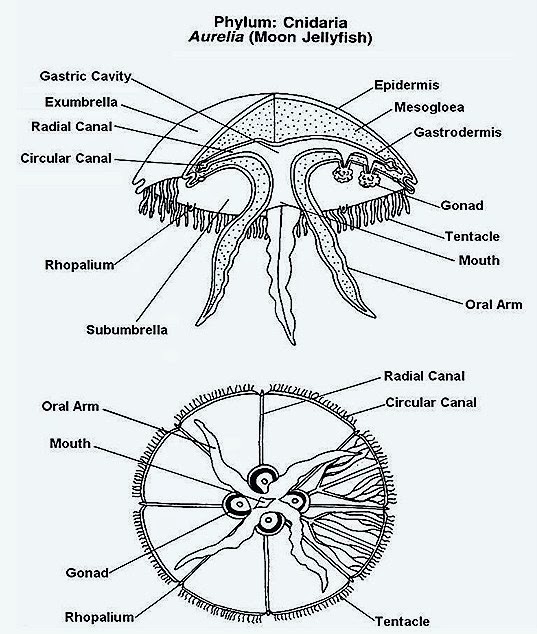JELLYFISH NUTRITION
AURELIA –GASTRO VASCULAR SYSTEM OF AND NUTRITION
Aurelia is also called as jellyfish. This jelly fish is umbrella shaped with outer ex-umbrellar surface and inner sub-umbrella surface.
Gastro Vascular system: In the middle of the sub-umbrellar surface a tetra angular mouth is present. It leads into a short gullet within the manubrium. It leads into a wide stomach. This stomach will show 4 gastric pouches on the 4 inter radial positions. In each gastric pouch may gastric filaments are present. These gastric filaments bear cnidoblasts
From the four corners of the mouth 4 oral arms will arise. These arms are long and perradial in position.
On the ventral side of each arm in the middle a ciliated groove is present. This groove leads into mouth. In these groves cnidoblasts are present.
From each gastric pouch 3 radial canals will form. The middle one is inter radial canal and the remaining two are ad-radial canals .Inter radial canals will branch, but ad-radial canals will not branch. Thus 4branchedi inter radial canals and unbranched radial canals will open into ring canal or circular canal on the margin of the umbrella.
Between two adjacent gastric pouches one perradial canal is present. It is branched. It is also connected with ring canal.
Circulation of water in the gastro vascular system: By the beating of cilia of the ventral grooves of oral arms, lining of the gastro vascular canals a current of water will circulate through gastro-vascular system in a fixed route.
Through mouth water enters into stomach. From stomach through gastro-Qenital canals water reaches the gastric pouches. Then through ad radial canals this water will reach ring canal. From this ring canal water will come to stomach through hyper radial canals. The water from ring canal will be brought to the ventral grooves of oral arms through inter-radial canals. Thus water circulates in the medusa. To complete one circulation, nearly 20 minutes time is required.

NUTRITION AURELIA: The incoming water brings food into the medusa body. The food of medusa consists of small crustaceans, worms, larval forms etc.,
a) Ingestion : Cnidoblasts of the oral arms, and gastric filaments will paralyze and entangle the prey.
b) Digestion: It is carried-on in stomach, and gastric pouches. A part of digestion is carried-on in the stomach by digestive enzymes, it is called extracellular digestion. This partly digested food is ingested by nutritive muscle cells of the endoderm and the digestion is completed. It is called intracellular digestion.
c) Absorption: The digested food is distributed to all parts of the body and is utilized.
d) Egestion : The undigested food is sent out through the out-going water.
